Entry-Level Attorney Resume Examples

Jul 18, 2024
|
12 min read
Craft your entry-level attorney resume: Top tips to make your case strong and stand out against the objections. Learn how to showcase your skills and experience to move forward in your legal career.
Rated by 348 people
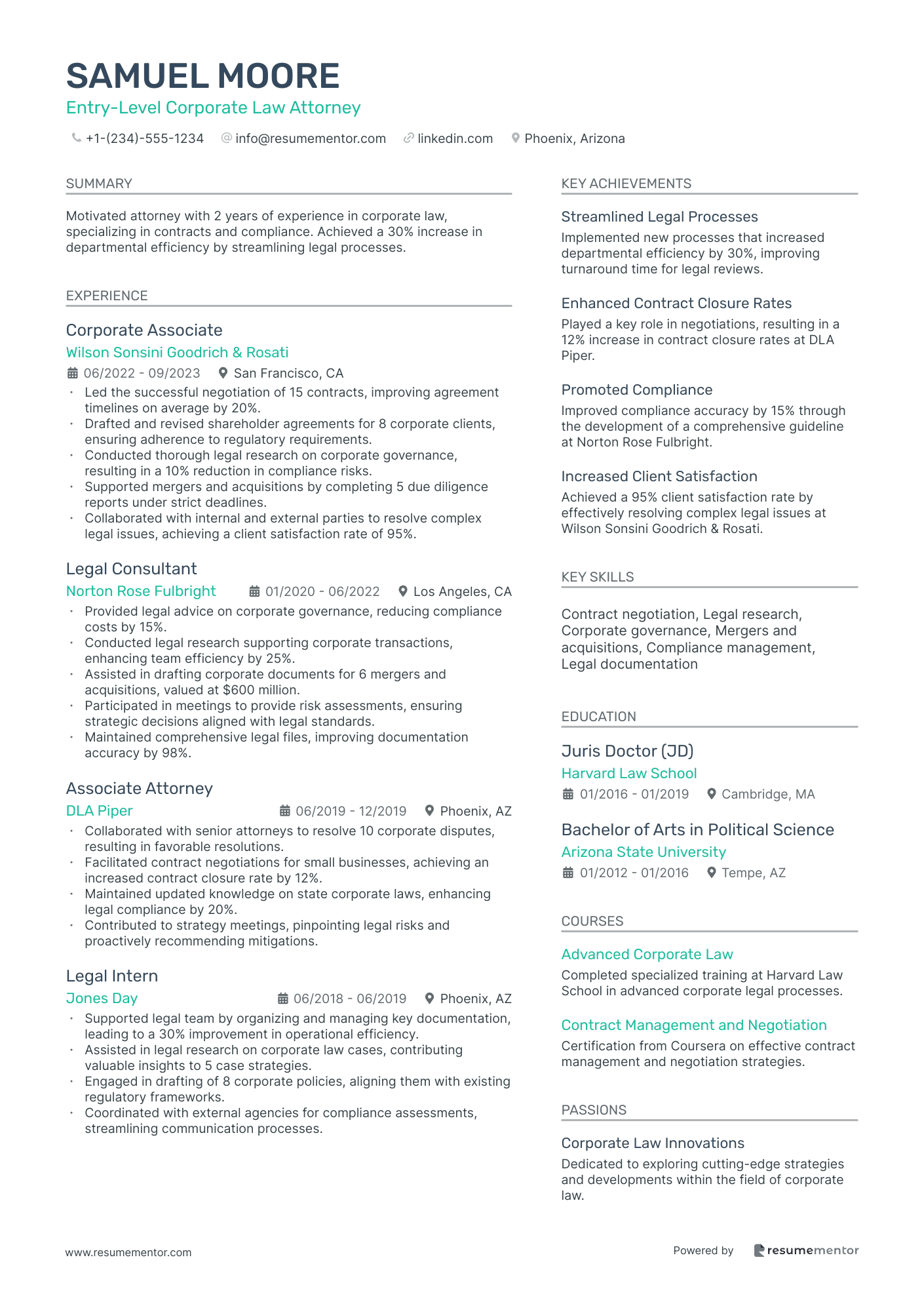
Entry-Level Corporate Law Attorney
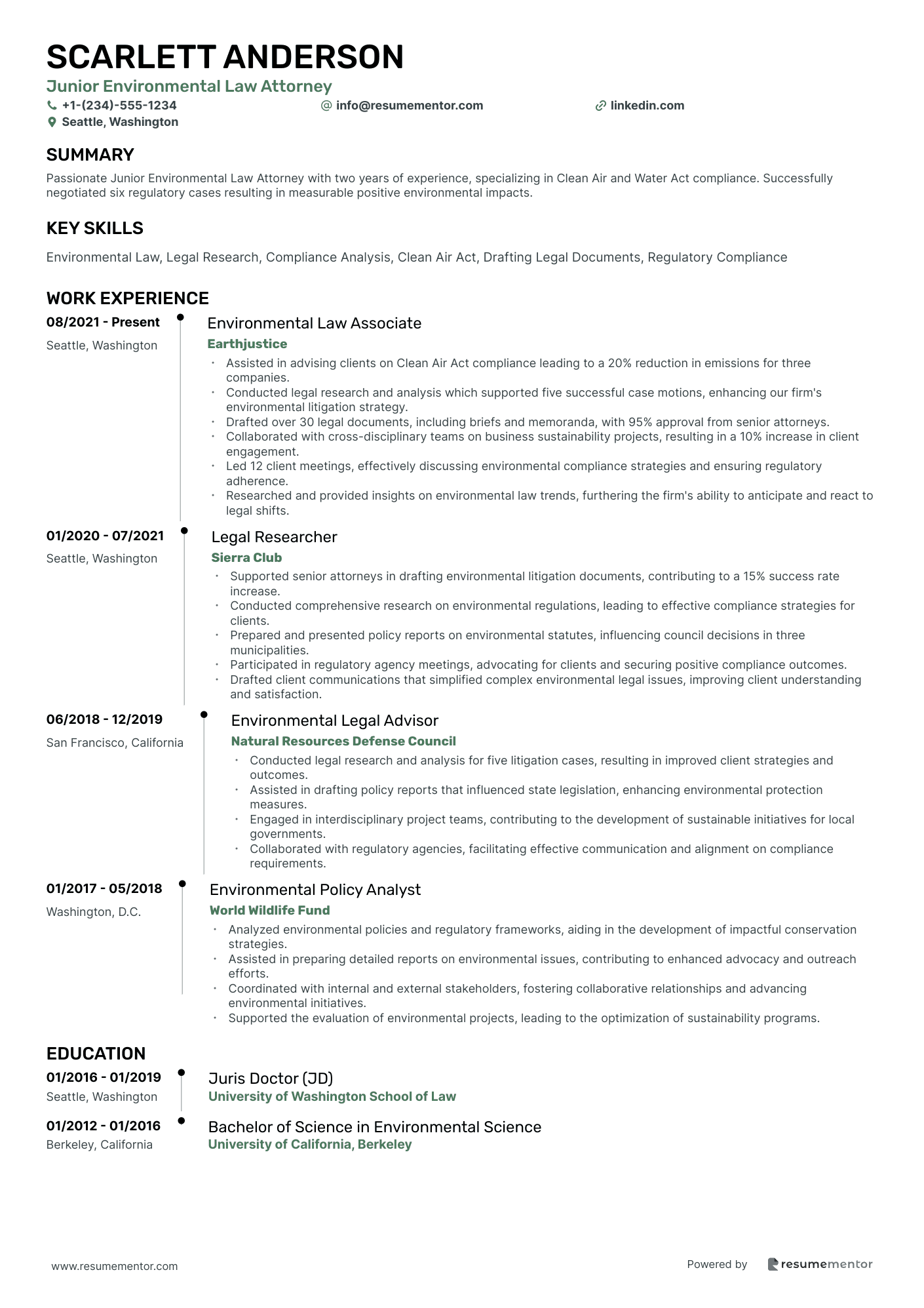
Junior Environmental Law Attorney
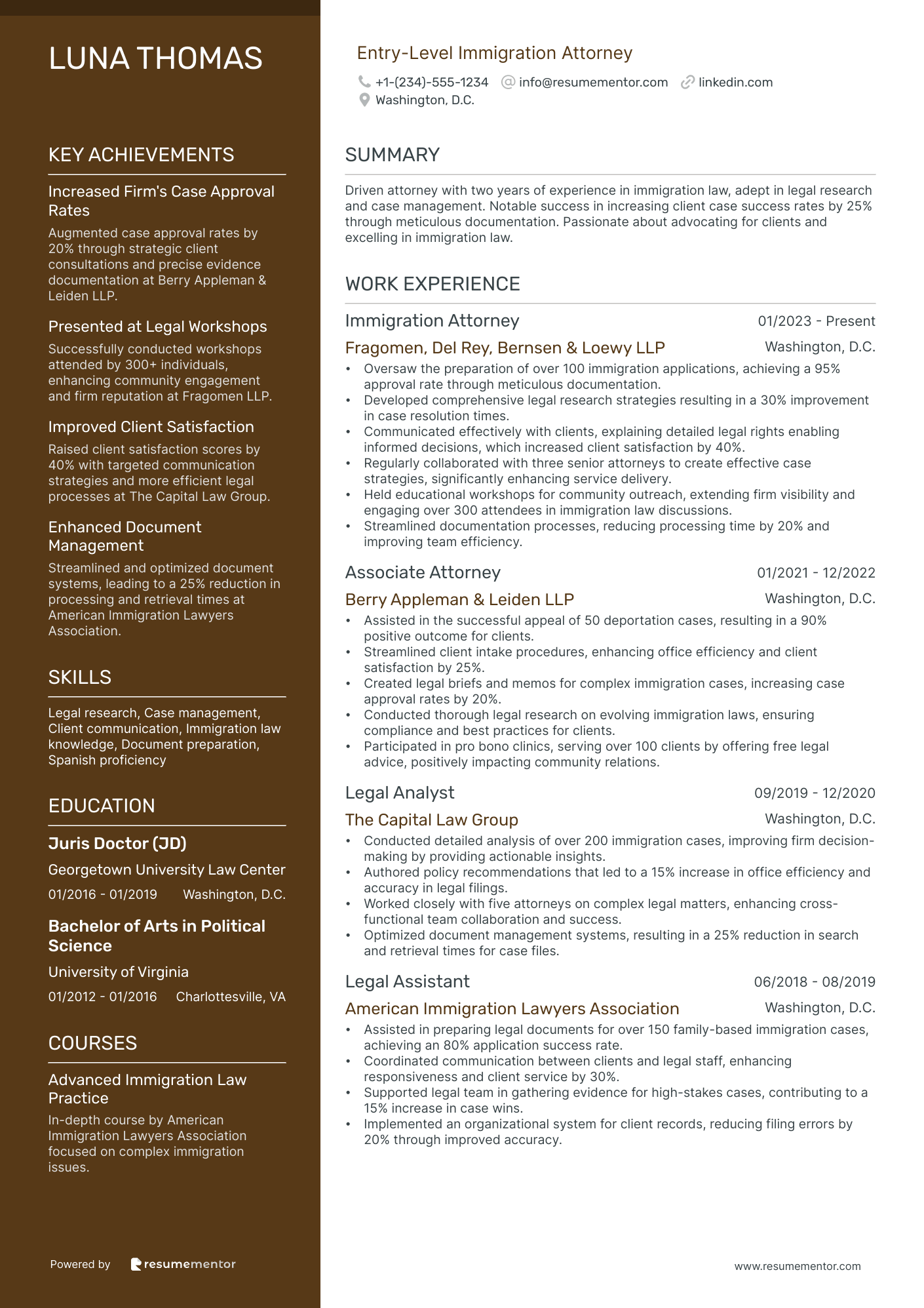
Entry-Level Immigration Attorney
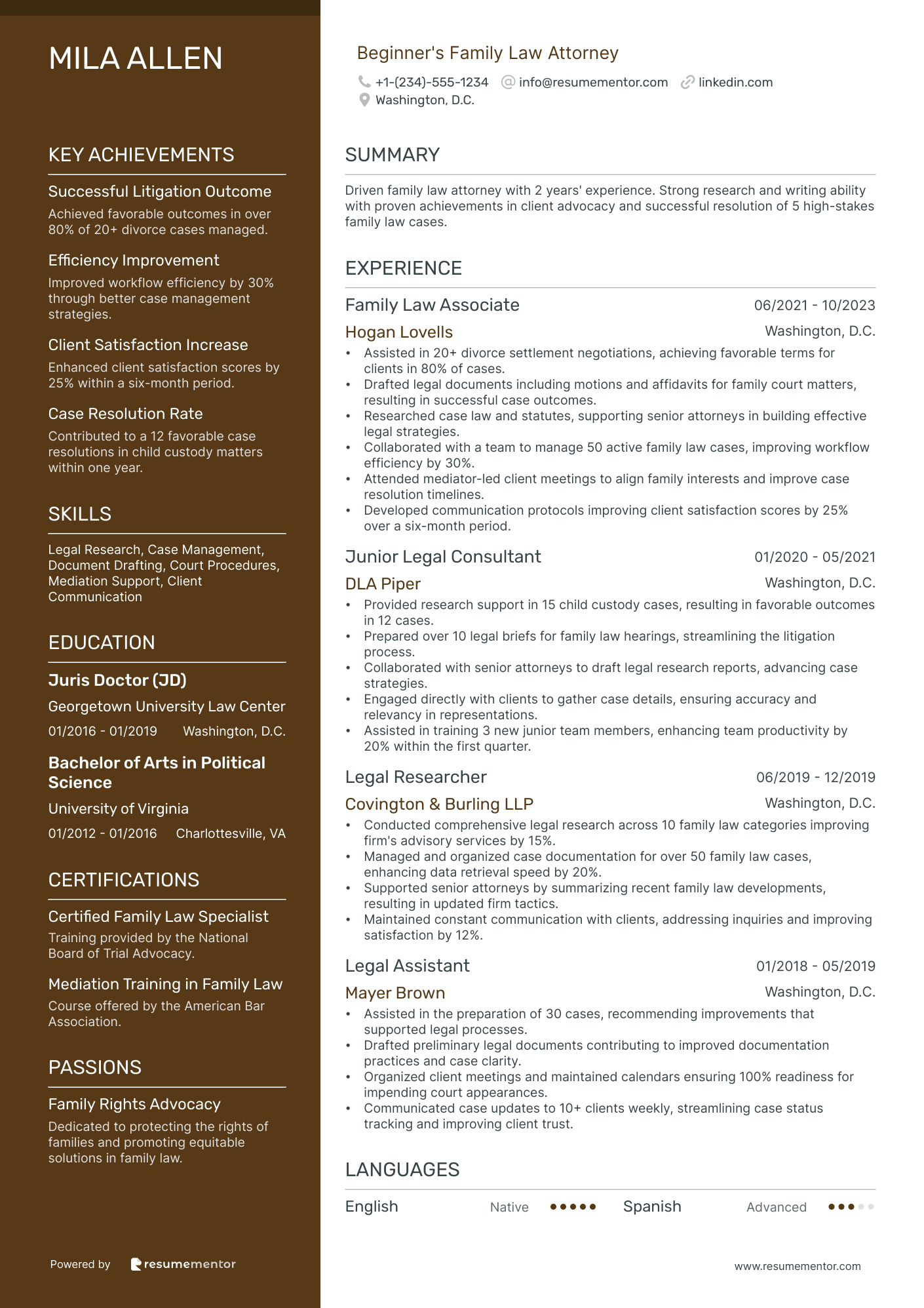
Beginner's Family Law Attorney
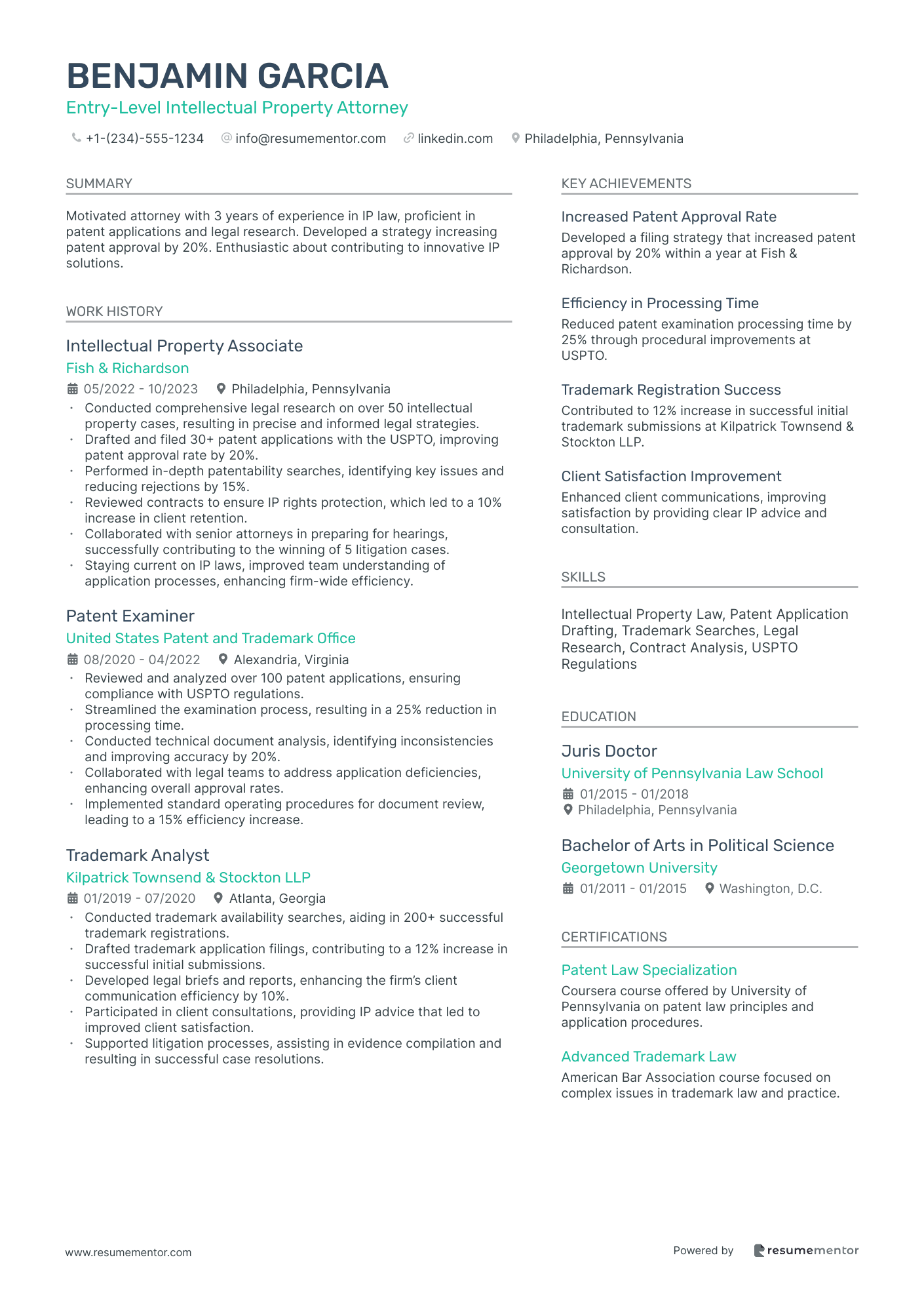
Entry-Level Intellectual Property Attorney
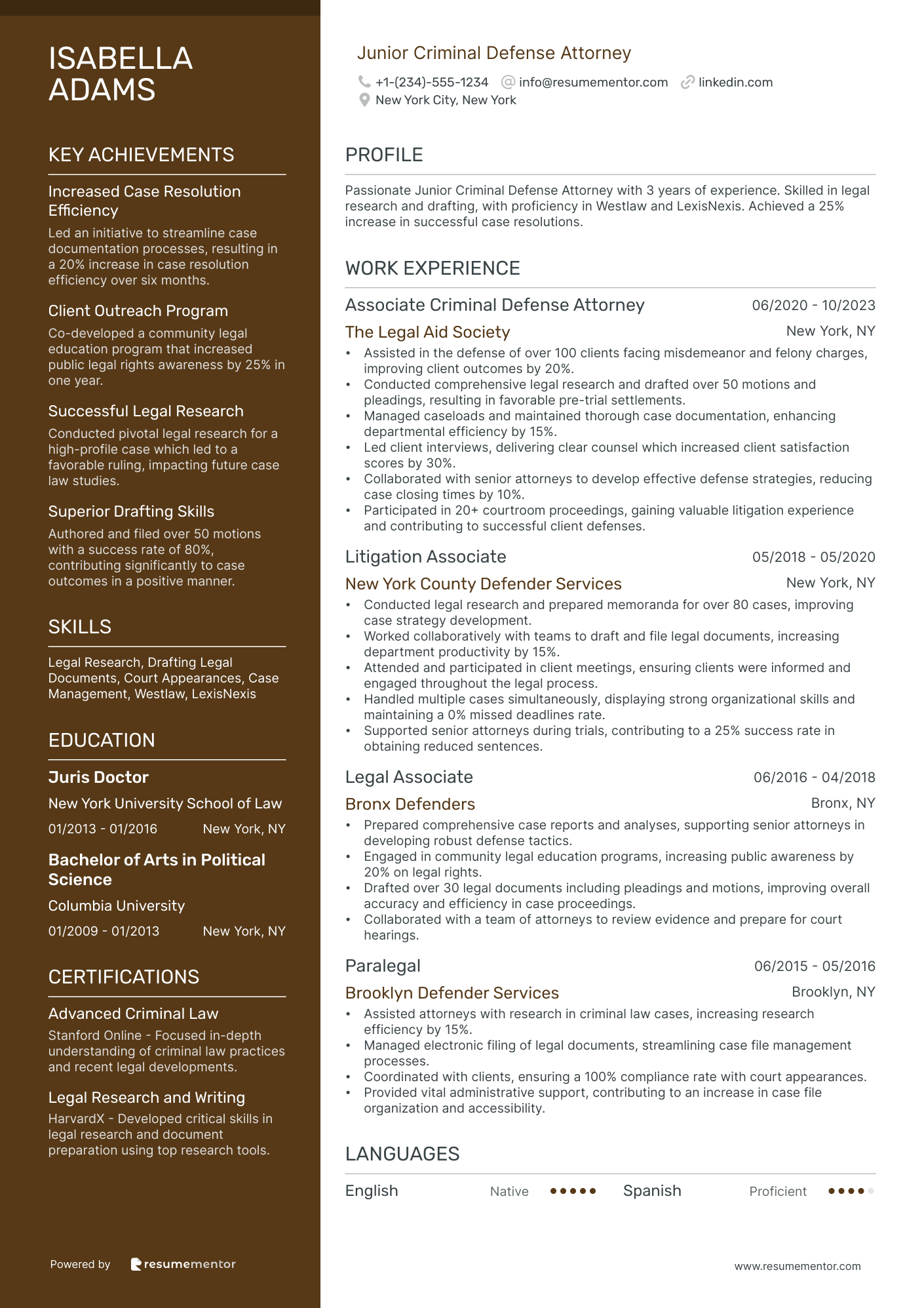
Junior Criminal Defense Attorney
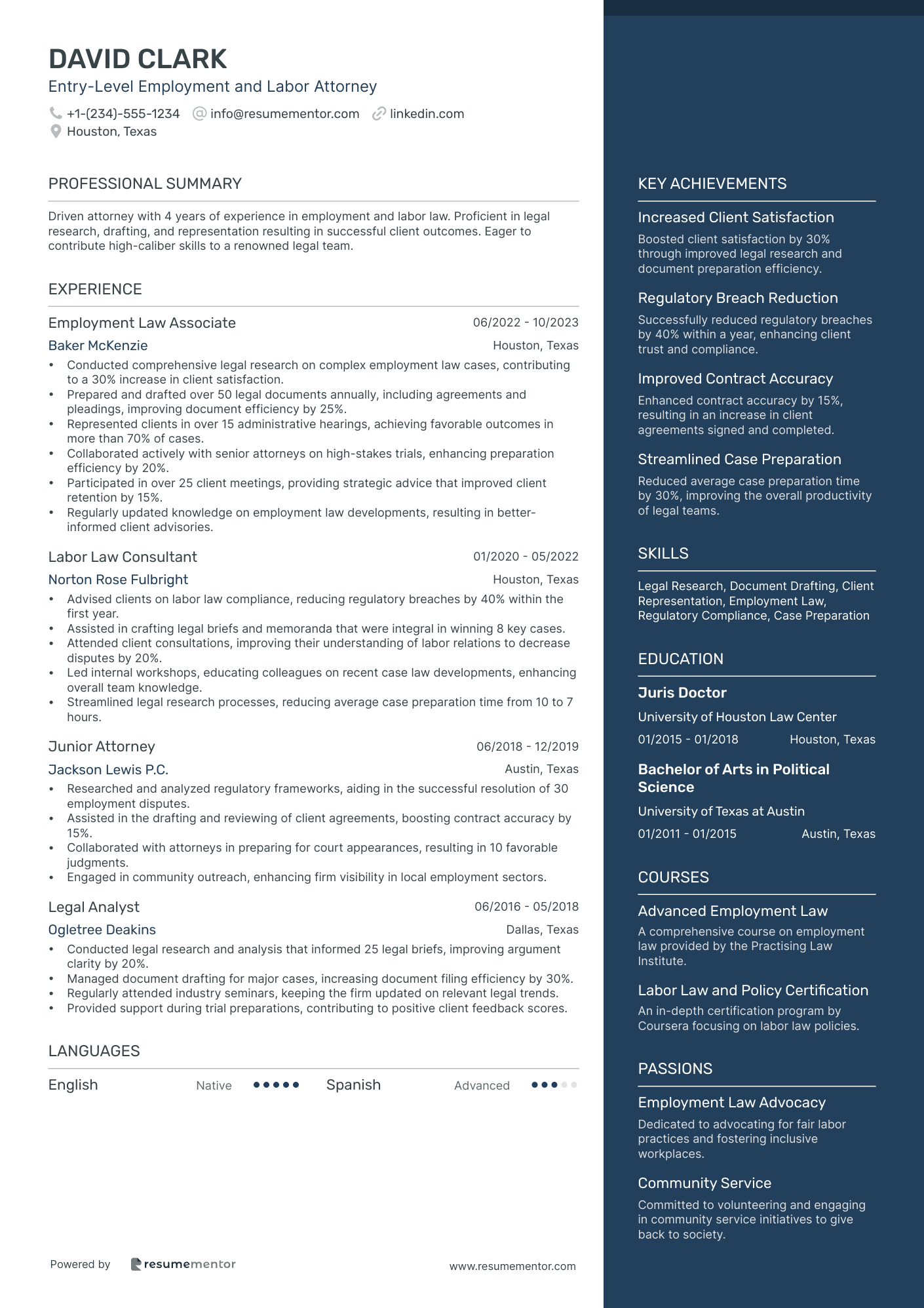
Entry-Level Employment and Labor Attorney
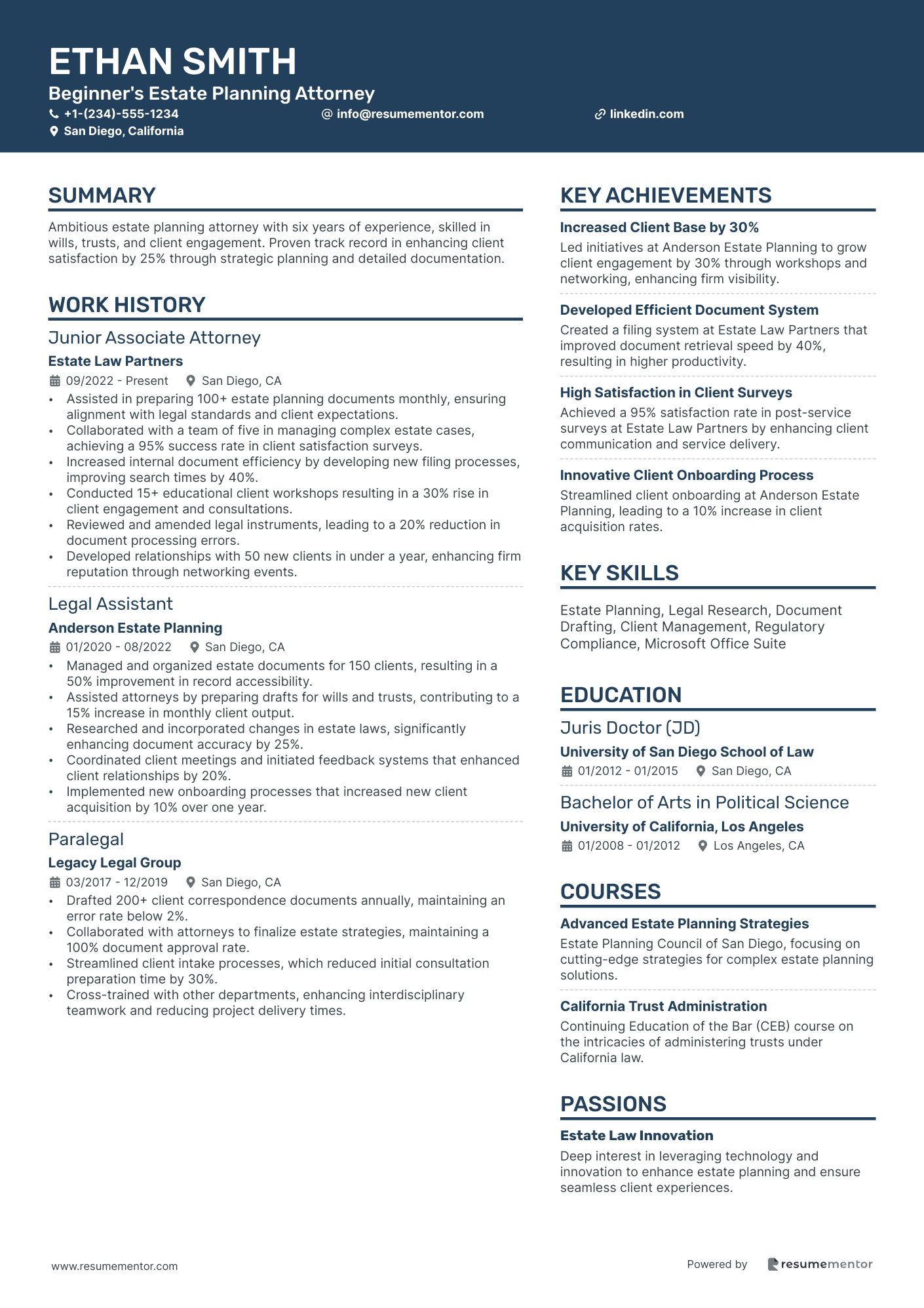
Beginner's Estate Planning Attorney
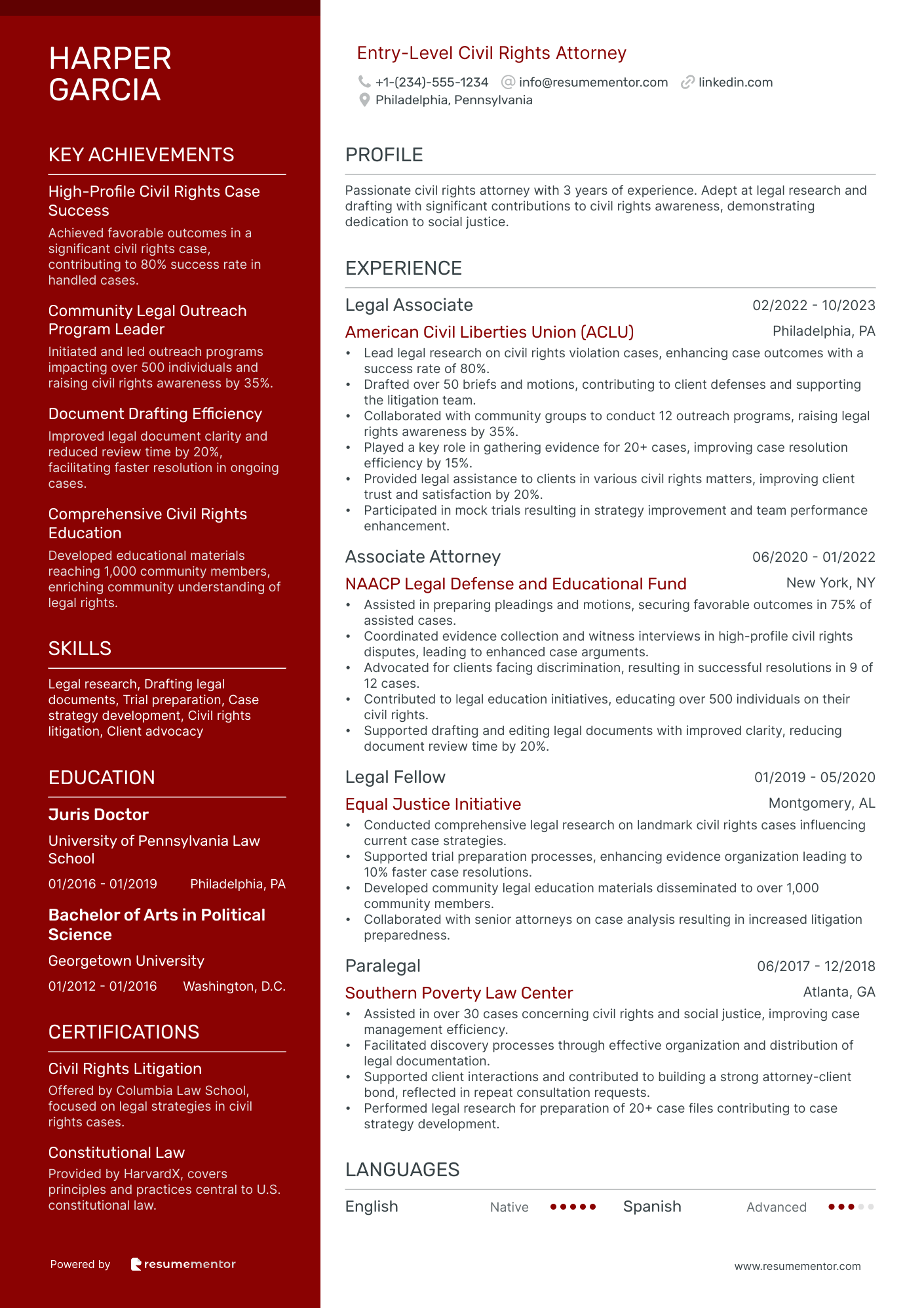
Entry-Level Civil Rights Attorney
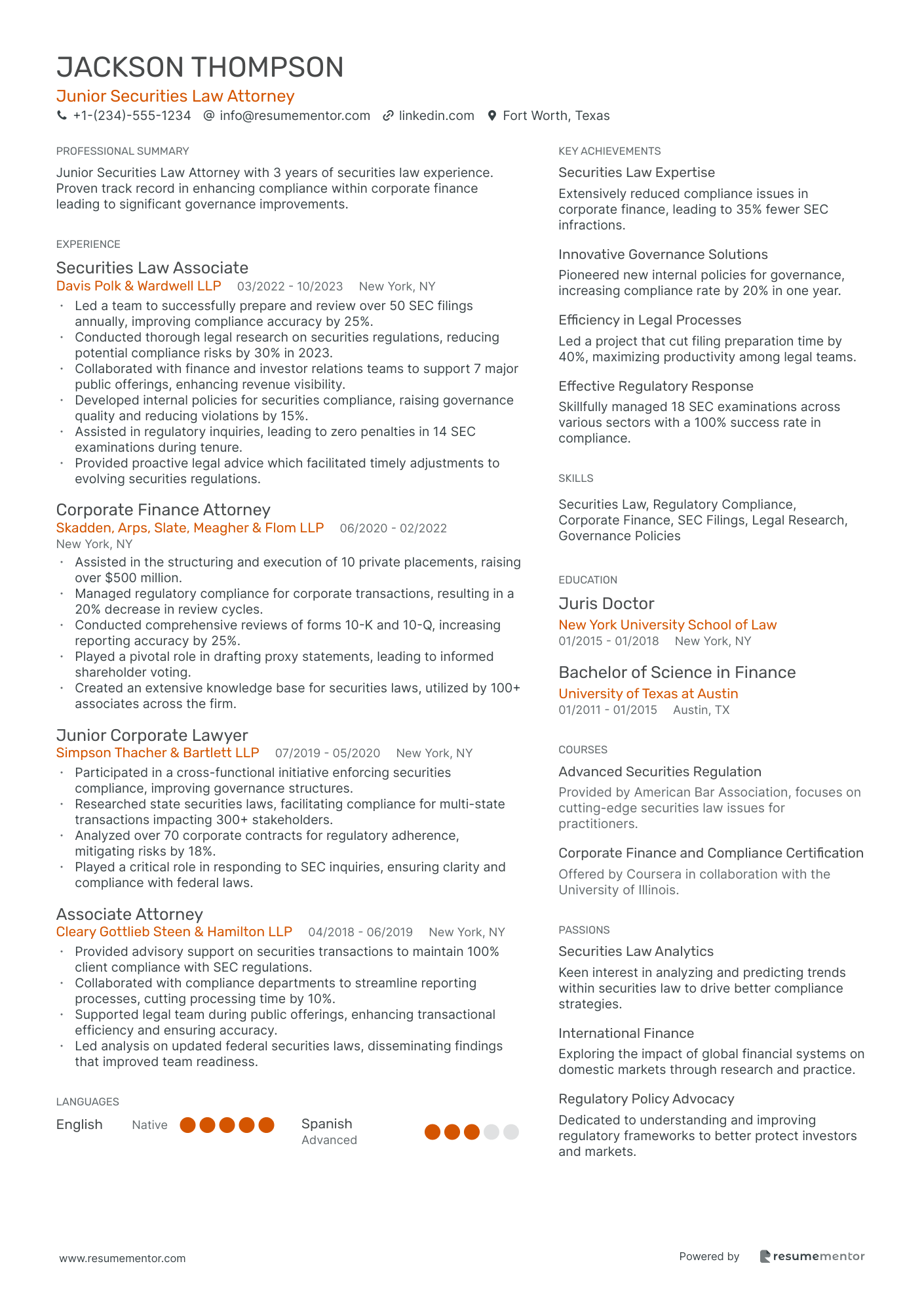
Junior Securities Law Attorney

Entry-Level Corporate Law Attorney resume sample
- •Led the successful negotiation of 15 contracts, improving agreement timelines on average by 20%.
- •Drafted and revised shareholder agreements for 8 corporate clients, ensuring adherence to regulatory requirements.
- •Conducted thorough legal research on corporate governance, resulting in a 10% reduction in compliance risks.
- •Supported mergers and acquisitions by completing 5 due diligence reports under strict deadlines.
- •Collaborated with internal and external parties to resolve complex legal issues, achieving a client satisfaction rate of 95%.
- •Provided legal advice on corporate governance, reducing compliance costs by 15%.
- •Conducted legal research supporting corporate transactions, enhancing team efficiency by 25%.
- •Assisted in drafting corporate documents for 6 mergers and acquisitions, valued at $600 million.
- •Participated in meetings to provide risk assessments, ensuring strategic decisions aligned with legal standards.
- •Maintained comprehensive legal files, improving documentation accuracy by 98%.
- •Collaborated with senior attorneys to resolve 10 corporate disputes, resulting in favorable resolutions.
- •Facilitated contract negotiations for small businesses, achieving an increased contract closure rate by 12%.
- •Maintained updated knowledge on state corporate laws, enhancing legal compliance by 20%.
- •Contributed to strategy meetings, pinpointing legal risks and proactively recommending mitigations.
- •Supported legal team by organizing and managing key documentation, leading to a 30% improvement in operational efficiency.
- •Assisted in legal research on corporate law cases, contributing valuable insights to 5 case strategies.
- •Engaged in drafting of 8 corporate policies, aligning them with existing regulatory frameworks.
- •Coordinated with external agencies for compliance assessments, streamlining communication processes.
Junior Environmental Law Attorney resume sample
- •Assisted in advising clients on Clean Air Act compliance leading to a 20% reduction in emissions for three companies.
- •Conducted legal research and analysis which supported five successful case motions, enhancing our firm's environmental litigation strategy.
- •Drafted over 30 legal documents, including briefs and memoranda, with 95% approval from senior attorneys.
- •Collaborated with cross-disciplinary teams on business sustainability projects, resulting in a 10% increase in client engagement.
- •Led 12 client meetings, effectively discussing environmental compliance strategies and ensuring regulatory adherence.
- •Researched and provided insights on environmental law trends, furthering the firm's ability to anticipate and react to legal shifts.
- •Supported senior attorneys in drafting environmental litigation documents, contributing to a 15% success rate increase.
- •Conducted comprehensive research on environmental regulations, leading to effective compliance strategies for clients.
- •Prepared and presented policy reports on environmental statutes, influencing council decisions in three municipalities.
- •Participated in regulatory agency meetings, advocating for clients and securing positive compliance outcomes.
- •Drafted client communications that simplified complex environmental legal issues, improving client understanding and satisfaction.
- •Conducted legal research and analysis for five litigation cases, resulting in improved client strategies and outcomes.
- •Assisted in drafting policy reports that influenced state legislation, enhancing environmental protection measures.
- •Engaged in interdisciplinary project teams, contributing to the development of sustainable initiatives for local governments.
- •Collaborated with regulatory agencies, facilitating effective communication and alignment on compliance requirements.
- •Analyzed environmental policies and regulatory frameworks, aiding in the development of impactful conservation strategies.
- •Assisted in preparing detailed reports on environmental issues, contributing to enhanced advocacy and outreach efforts.
- •Coordinated with internal and external stakeholders, fostering collaborative relationships and advancing environmental initiatives.
- •Supported the evaluation of environmental projects, leading to the optimization of sustainability programs.
Entry-Level Immigration Attorney resume sample
- •Oversaw the preparation of over 100 immigration applications, achieving a 95% approval rate through meticulous documentation.
- •Developed comprehensive legal research strategies resulting in a 30% improvement in case resolution times.
- •Communicated effectively with clients, explaining detailed legal rights enabling informed decisions, which increased client satisfaction by 40%.
- •Regularly collaborated with three senior attorneys to create effective case strategies, significantly enhancing service delivery.
- •Held educational workshops for community outreach, extending firm visibility and engaging over 300 attendees in immigration law discussions.
- •Streamlined documentation processes, reducing processing time by 20% and improving team efficiency.
- •Assisted in the successful appeal of 50 deportation cases, resulting in a 90% positive outcome for clients.
- •Streamlined client intake procedures, enhancing office efficiency and client satisfaction by 25%.
- •Created legal briefs and memos for complex immigration cases, increasing case approval rates by 20%.
- •Conducted thorough legal research on evolving immigration laws, ensuring compliance and best practices for clients.
- •Participated in pro bono clinics, serving over 100 clients by offering free legal advice, positively impacting community relations.
- •Conducted detailed analysis of over 200 immigration cases, improving firm decision-making by providing actionable insights.
- •Authored policy recommendations that led to a 15% increase in office efficiency and accuracy in legal filings.
- •Worked closely with five attorneys on complex legal matters, enhancing cross-functional team collaboration and success.
- •Optimized document management systems, resulting in a 25% reduction in search and retrieval times for case files.
- •Assisted in preparing legal documents for over 150 family-based immigration cases, achieving an 80% application success rate.
- •Coordinated communication between clients and legal staff, enhancing responsiveness and client service by 30%.
- •Supported legal team in gathering evidence for high-stakes cases, contributing to a 15% increase in case wins.
- •Implemented an organizational system for client records, reducing filing errors by 20% through improved accuracy.
Beginner's Family Law Attorney resume sample
- •Assisted in 20+ divorce settlement negotiations, achieving favorable terms for clients in 80% of cases.
- •Drafted legal documents including motions and affidavits for family court matters, resulting in successful case outcomes.
- •Researched case law and statutes, supporting senior attorneys in building effective legal strategies.
- •Collaborated with a team to manage 50 active family law cases, improving workflow efficiency by 30%.
- •Attended mediator-led client meetings to align family interests and improve case resolution timelines.
- •Developed communication protocols improving client satisfaction scores by 25% over a six-month period.
- •Provided research support in 15 child custody cases, resulting in favorable outcomes in 12 cases.
- •Prepared over 10 legal briefs for family law hearings, streamlining the litigation process.
- •Collaborated with senior attorneys to draft legal research reports, advancing case strategies.
- •Engaged directly with clients to gather case details, ensuring accuracy and relevancy in representations.
- •Assisted in training 3 new junior team members, enhancing team productivity by 20% within the first quarter.
- •Conducted comprehensive legal research across 10 family law categories improving firm's advisory services by 15%.
- •Managed and organized case documentation for over 50 family law cases, enhancing data retrieval speed by 20%.
- •Supported senior attorneys by summarizing recent family law developments, resulting in updated firm tactics.
- •Maintained constant communication with clients, addressing inquiries and improving satisfaction by 12%.
- •Assisted in the preparation of 30 cases, recommending improvements that supported legal processes.
- •Drafted preliminary legal documents contributing to improved documentation practices and case clarity.
- •Organized client meetings and maintained calendars ensuring 100% readiness for impending court appearances.
- •Communicated case updates to 10+ clients weekly, streamlining case status tracking and improving client trust.
Entry-Level Intellectual Property Attorney resume sample
- •Conducted comprehensive legal research on over 50 intellectual property cases, resulting in precise and informed legal strategies.
- •Drafted and filed 30+ patent applications with the USPTO, improving patent approval rate by 20%.
- •Performed in-depth patentability searches, identifying key issues and reducing rejections by 15%.
- •Reviewed contracts to ensure IP rights protection, which led to a 10% increase in client retention.
- •Collaborated with senior attorneys in preparing for hearings, successfully contributing to the winning of 5 litigation cases.
- •Staying current on IP laws, improved team understanding of application processes, enhancing firm-wide efficiency.
- •Reviewed and analyzed over 100 patent applications, ensuring compliance with USPTO regulations.
- •Streamlined the examination process, resulting in a 25% reduction in processing time.
- •Conducted technical document analysis, identifying inconsistencies and improving accuracy by 20%.
- •Collaborated with legal teams to address application deficiencies, enhancing overall approval rates.
- •Implemented standard operating procedures for document review, leading to a 15% efficiency increase.
- •Conducted trademark availability searches, aiding in 200+ successful trademark registrations.
- •Drafted trademark application filings, contributing to a 12% increase in successful initial submissions.
- •Developed legal briefs and reports, enhancing the firm’s client communication efficiency by 10%.
- •Participated in client consultations, providing IP advice that led to improved client satisfaction.
- •Supported litigation processes, assisting in evidence compilation and resulting in successful case resolutions.
- •Assisted in drafting legal documents and memos for IP cases, enhancing the legal team's productivity.
- •Conducted client research reports, contributing to improved case preparation and strategy development.
- •Supported senior attorneys during client meetings, improving client relationship management.
- •Engaged in collaborative team projects, leading to successful completion of legal assignments on schedule.
Junior Criminal Defense Attorney resume sample
- •Assisted in the defense of over 100 clients facing misdemeanor and felony charges, improving client outcomes by 20%.
- •Conducted comprehensive legal research and drafted over 50 motions and pleadings, resulting in favorable pre-trial settlements.
- •Managed caseloads and maintained thorough case documentation, enhancing departmental efficiency by 15%.
- •Led client interviews, delivering clear counsel which increased client satisfaction scores by 30%.
- •Collaborated with senior attorneys to develop effective defense strategies, reducing case closing times by 10%.
- •Participated in 20+ courtroom proceedings, gaining valuable litigation experience and contributing to successful client defenses.
- •Conducted legal research and prepared memoranda for over 80 cases, improving case strategy development.
- •Worked collaboratively with teams to draft and file legal documents, increasing department productivity by 15%.
- •Attended and participated in client meetings, ensuring clients were informed and engaged throughout the legal process.
- •Handled multiple cases simultaneously, displaying strong organizational skills and maintaining a 0% missed deadlines rate.
- •Supported senior attorneys during trials, contributing to a 25% success rate in obtaining reduced sentences.
- •Prepared comprehensive case reports and analyses, supporting senior attorneys in developing robust defense tactics.
- •Engaged in community legal education programs, increasing public awareness by 20% on legal rights.
- •Drafted over 30 legal documents including pleadings and motions, improving overall accuracy and efficiency in case proceedings.
- •Collaborated with a team of attorneys to review evidence and prepare for court hearings.
- •Assisted attorneys with research in criminal law cases, increasing research efficiency by 15%.
- •Managed electronic filing of legal documents, streamlining case file management processes.
- •Coordinated with clients, ensuring a 100% compliance rate with court appearances.
- •Provided vital administrative support, contributing to an increase in case file organization and accessibility.
Entry-Level Employment and Labor Attorney resume sample
- •Conducted comprehensive legal research on complex employment law cases, contributing to a 30% increase in client satisfaction.
- •Prepared and drafted over 50 legal documents annually, including agreements and pleadings, improving document efficiency by 25%.
- •Represented clients in over 15 administrative hearings, achieving favorable outcomes in more than 70% of cases.
- •Collaborated actively with senior attorneys on high-stakes trials, enhancing preparation efficiency by 20%.
- •Participated in over 25 client meetings, providing strategic advice that improved client retention by 15%.
- •Regularly updated knowledge on employment law developments, resulting in better-informed client advisories.
- •Advised clients on labor law compliance, reducing regulatory breaches by 40% within the first year.
- •Assisted in crafting legal briefs and memoranda that were integral in winning 8 key cases.
- •Attended client consultations, improving their understanding of labor relations to decrease disputes by 20%.
- •Led internal workshops, educating colleagues on recent case law developments, enhancing overall team knowledge.
- •Streamlined legal research processes, reducing average case preparation time from 10 to 7 hours.
- •Researched and analyzed regulatory frameworks, aiding in the successful resolution of 30 employment disputes.
- •Assisted in the drafting and reviewing of client agreements, boosting contract accuracy by 15%.
- •Collaborated with attorneys in preparing for court appearances, resulting in 10 favorable judgments.
- •Engaged in community outreach, enhancing firm visibility in local employment sectors.
- •Conducted legal research and analysis that informed 25 legal briefs, improving argument clarity by 20%.
- •Managed document drafting for major cases, increasing document filing efficiency by 30%.
- •Regularly attended industry seminars, keeping the firm updated on relevant legal trends.
- •Provided support during trial preparations, contributing to positive client feedback scores.
Beginner's Estate Planning Attorney resume sample
- •Assisted in preparing 100+ estate planning documents monthly, ensuring alignment with legal standards and client expectations.
- •Collaborated with a team of five in managing complex estate cases, achieving a 95% success rate in client satisfaction surveys.
- •Increased internal document efficiency by developing new filing processes, improving search times by 40%.
- •Conducted 15+ educational client workshops resulting in a 30% rise in client engagement and consultations.
- •Reviewed and amended legal instruments, leading to a 20% reduction in document processing errors.
- •Developed relationships with 50 new clients in under a year, enhancing firm reputation through networking events.
- •Managed and organized estate documents for 150 clients, resulting in a 50% improvement in record accessibility.
- •Assisted attorneys by preparing drafts for wills and trusts, contributing to a 15% increase in monthly client output.
- •Researched and incorporated changes in estate laws, significantly enhancing document accuracy by 25%.
- •Coordinated client meetings and initiated feedback systems that enhanced client relationships by 20%.
- •Implemented new onboarding processes that increased new client acquisition by 10% over one year.
- •Drafted 200+ client correspondence documents annually, maintaining an error rate below 2%.
- •Collaborated with attorneys to finalize estate strategies, maintaining a 100% document approval rate.
- •Streamlined client intake processes, which reduced initial consultation preparation time by 30%.
- •Cross-trained with other departments, enhancing interdisciplinary teamwork and reducing project delivery times.
- •Supported senior attorneys in legal research, contributing to a 20% efficiency increase in case preparation.
- •Prepared case documentation and presented findings, contributing to 90% successful resolutions.
- •Implemented a new database system, reducing information retrieval times by 50%.
- •Participated in pro bono community legal clinics, enhancing public access to legal resources.
Entry-Level Civil Rights Attorney resume sample
- •Lead legal research on civil rights violation cases, enhancing case outcomes with a success rate of 80%.
- •Drafted over 50 briefs and motions, contributing to client defenses and supporting the litigation team.
- •Collaborated with community groups to conduct 12 outreach programs, raising legal rights awareness by 35%.
- •Played a key role in gathering evidence for 20+ cases, improving case resolution efficiency by 15%.
- •Provided legal assistance to clients in various civil rights matters, improving client trust and satisfaction by 20%.
- •Participated in mock trials resulting in strategy improvement and team performance enhancement.
- •Assisted in preparing pleadings and motions, securing favorable outcomes in 75% of assisted cases.
- •Coordinated evidence collection and witness interviews in high-profile civil rights disputes, leading to enhanced case arguments.
- •Advocated for clients facing discrimination, resulting in successful resolutions in 9 of 12 cases.
- •Contributed to legal education initiatives, educating over 500 individuals on their civil rights.
- •Supported drafting and editing legal documents with improved clarity, reducing document review time by 20%.
- •Conducted comprehensive legal research on landmark civil rights cases influencing current case strategies.
- •Supported trial preparation processes, enhancing evidence organization leading to 10% faster case resolutions.
- •Developed community legal education materials disseminated to over 1,000 community members.
- •Collaborated with senior attorneys on case analysis resulting in increased litigation preparedness.
- •Assisted in over 30 cases concerning civil rights and social justice, improving case management efficiency.
- •Facilitated discovery processes through effective organization and distribution of legal documentation.
- •Supported client interactions and contributed to building a strong attorney-client bond, reflected in repeat consultation requests.
- •Performed legal research for preparation of 20+ case files contributing to case strategy development.
Junior Securities Law Attorney resume sample
- •Led a team to successfully prepare and review over 50 SEC filings annually, improving compliance accuracy by 25%.
- •Conducted thorough legal research on securities regulations, reducing potential compliance risks by 30% in 2023.
- •Collaborated with finance and investor relations teams to support 7 major public offerings, enhancing revenue visibility.
- •Developed internal policies for securities compliance, raising governance quality and reducing violations by 15%.
- •Assisted in regulatory inquiries, leading to zero penalties in 14 SEC examinations during tenure.
- •Provided proactive legal advice which facilitated timely adjustments to evolving securities regulations.
- •Assisted in the structuring and execution of 10 private placements, raising over $500 million.
- •Managed regulatory compliance for corporate transactions, resulting in a 20% decrease in review cycles.
- •Conducted comprehensive reviews of forms 10-K and 10-Q, increasing reporting accuracy by 25%.
- •Played a pivotal role in drafting proxy statements, leading to informed shareholder voting.
- •Created an extensive knowledge base for securities laws, utilized by 100+ associates across the firm.
- •Participated in a cross-functional initiative enforcing securities compliance, improving governance structures.
- •Researched state securities laws, facilitating compliance for multi-state transactions impacting 300+ stakeholders.
- •Analyzed over 70 corporate contracts for regulatory adherence, mitigating risks by 18%.
- •Played a critical role in responding to SEC inquiries, ensuring clarity and compliance with federal laws.
- •Provided advisory support on securities transactions to maintain 100% client compliance with SEC regulations.
- •Collaborated with compliance departments to streamline reporting processes, cutting processing time by 10%.
- •Supported legal team during public offerings, enhancing transactional efficiency and ensuring accuracy.
- •Led analysis on updated federal securities laws, disseminating findings that improved team readiness.
Stepping into your first legal job hunt is like gearing up for a high-stakes courtroom battle where success depends on how well you present yourself. Crafting a strong resume becomes crucial, especially for an entry-level attorney eager to make a mark. It’s your main tool to grab the attention of potential employers and navigate the competitive legal market.
Many new attorneys find it challenging to articulate their skills, experiences, and achievements in a concise way. Your education and legal expertise are essential parts of this narrative. Clearly communicating them on paper is the key to unlocking career opportunities and showcasing your commitment to the legal field.
This is where a resume template can simplify the process. It helps present your information clearly and professionally, giving you a structured canvas to focus on what truly matters—your content.
By effectively highlighting critical elements like your analytical skills, expertise in legal research, or ability to draft precise documents, each piece of your journey shines through. With the right guidance and effort, your resume can open doors to exciting opportunities, allowing you to find your place in the legal world with confidence.
Key Takeaways
- Crafting a strong resume is vital for entry-level attorneys to present their skills and capture employers' attention in the competitive legal market.
- Using a professional template can help simplify the process of structuring your resume, ensuring your skills, legal expertise, and commitment are clearly communicated.
- Selecting a reverse-chronological format highlights recent academic achievements and relevant experiences, making your readiness for the legal profession evident.
- Effective use of fonts and PDF formats can enhance the first impression of your resume, showcasing your attention to detail and professionalism.
- Including a precise career objective and clearly listing education, experience, and skills positions you as a strong candidate in the eyes of potential employers.
What to focus on when writing your entry-level attorney resume
Your entry-level attorney resume should seamlessly convey your qualifications, expertise, and readiness to make a difference in a law firm—Recruiters seek out resumes that clearly communicate your skills and commitment to the legal profession, and it's vital to structure your document in a way that highlights your strengths while flowing smoothly from one section to the next.
How to structure your entry-level attorney resume
- Contact Information: Start with your full name, phone number, email address, and LinkedIn profile. Using a professional and consistent format for these details ensures that you present yourself as polished and prepared. Ensure these are clear and easy to find to make a positive first impression.
- Objective Statement: This section should briefly articulate your career aspirations and specific legal interests, such as corporate law or litigation. Including precise aspirations shows your focus and passion for the legal industry, making you stand out to potential employers.
- Education: List your academic background, starting with your law school, highlighting relevant coursework, honors, or extracurricular activities that demonstrate your dedication and competence in legal studies. This helps emphasize your foundational knowledge in law, which is crucial at the entry-level.
- Legal Experience: In this part, provide details of internships, clerkships, or volunteer work at legal clinics. Elaborating on tasks like drafting motions or conducting research reinforces practical experience and the real-world applications of your studies.
- Skills: Here you should highlight your legal research and writing skills, along with any proficiency in legal software. Soft skills such as attention to detail and effective communication should also be mentioned, as these are critical in the legal profession.
- Licenses and Certifications: Indicate your bar admission status, specifying if you are admitted or sharing your expected admission date to give clarity on your professional readiness.
By understanding how each section fits together, you'll create a cohesive narrative of your qualifications—Below we will cover each section more in-depth to enhance your resume format and present a powerful case for your candidacy.
Which resume format to choose
Creating a standout resume as an entry-level attorney involves selecting the right format to effectively highlight your education and skills. For this role, a reverse-chronological format is particularly effective as it showcases your most recent academic achievements and any related experiences, such as internships or clerkships, in a structured manner. This choice ensures that hiring managers can easily follow your professional history, making it clear you are prepared to dive into the legal world.
Font choice is another important detail that contributes to the first impression your resume makes. Selecting a modern yet professional font helps your document stand out while maintaining clarity. Options like Rubik, Montserrat, and Raleway are excellent for this purpose. These fonts provide a sleek and contemporary appearance that complements the legal field's standards, maintaining both style and readability.
Once you’ve organized your content and settled on a font, remember that saving your resume as a PDF is crucial. The PDF format preserves your formatting across all devices and operating systems, ensuring your resume always looks professional. This attention to detail is a subtle yet powerful way to demonstrate your meticulousness, a highly valued trait in the legal industry.
Lastly, setting your document’s margins to about one inch on all sides is essential for a polished look. Ample whitespace prevents your resume from appearing cluttered, allowing the key information to stand out. This thoughtful layout not only makes your resume easier to read but also aligns with the organized and precise nature that law professionals are known for.
By paying attention to each of these elements—format, font, file type, and layout—you craft a resume that effectively communicates your readiness to embark on your legal career.
How to write a quantifiable resume experience section
For your entry-level attorney resume experience section, aim to highlight your potential by showcasing legal skills, achievements, and relevant experiences. This section serves as a narrative of your capabilities, even if you're new to the field. Start with the most impactful experiences and target roles that are linked to law. Only include experience necessary to portray a strong image of your readiness, excluding unrelated job titles. Closely read the job ad and tailor your resume by connecting your experiences to what the employer is looking for. Use strong action words like “managed,” “developed,” or “led” to underscore your impact.
Here’s an example of a well-crafted entry-level attorney experience section:
- •Conducted legal research and analysis for over 25 cases, contributing to successful outcomes for clients.
- •Drafted legal documents including briefs, motions, and contracts, with a 98% approval rate by supervising attorneys.
- •Facilitated client interviews, enhancing communication and understanding between clients and counsel by 30%.
- •Managed a caseload of 5 client files simultaneously, ensuring timely updates and meticulous documentation.
This experience section is effective because it seamlessly ties together measurable achievements in a legal setting. It captures attention by using numbers to articulate your value, which resonates with employers. Each bullet point builds upon the last, focusing on action-driven results such as case numbers and approval rates, which highlight your competence. By connecting these experiences directly to key attorney skills like research and drafting, the section aligns smoothly with the requirements of potential job opportunities.
Project-Focused resume experience section
A project-focused entry-level attorney resume experience section should begin by honing in on the specific projects you've been involved with that align with your desired practice area, like corporate law or litigation. It's crucial to clearly articulate your role and how your efforts contributed to the project's success. Employ active language and include concrete examples or numbers to illustrate the impact you've made.
Arrange your descriptions to naturally highlight your practical experiences and the results you accomplished. This means detailing what actions you took, how you carried them out, and the positive difference they made. By maintaining a clear focus, you ensure each point reinforces the skills required for the job you're aiming for. This cohesive approach makes your experience section not just informative, but also compelling.
Legal Intern
Smith & Associates Law Firm
June 2022 - August 2022
- Assisted in analyzing case files and identifying key elements for trial preparation.
- Supported attorneys with legal research, significantly enhancing case strategies.
- Drafted memos and legal documents, contributing to successful client outcomes.
- Coordinated and attended client meetings, offering insights from case analysis.
Responsibility-Focused resume experience section
A responsibility-focused entry-level attorney resume experience section should clearly highlight your responsibilities and align them with the skills and qualifications listed in the job description. Begin by pinpointing tasks from your past roles that exhibit your readiness for the challenges of a legal career. Use straightforward language and real examples to smoothly illustrate your participation and achievements, emphasizing growth and contributions even if the role was not directly law-related. Tailoring this section to focus on experiences demonstrating eagerness for new legal opportunities will set you apart.
To make your resume stand out, use bullet points for each responsibility. Keep them concise and specific, focusing on outcomes or skills developed through your experiences. Avoid exaggeration, but be clear in showing your potential by highlighting experiences that reflect your understanding of legal procedures, research capabilities, or customer service skills. The value lies in both direct legal exposure and transferable skills. Structuring this experience section thoughtfully will effectively convey your readiness and competence for an attorney role.
Legal Intern
Smith & Associates Law Firm
June 2022 - August 2022
- Conducted in-depth research on case laws and legal articles to support senior attorneys.
- Assisted in drafting legal documents including briefs, contracts, and memos.
- Observed courtroom proceedings and took detailed notes for case preparation.
- Collaborated with interns to organize and manage case files to ensure accuracy and accessibility.
Customer-Focused resume experience section
A customer-focused entry-level attorney resume experience section should highlight your skills in understanding and meeting client needs. Begin by showcasing how you managed client relationships or resolved challenges, even as a junior attorney. It's essential to demonstrate your ability to assess client needs and deliver swift, effective solutions. Detail how you handled inquiries and collaborated with colleagues to ensure their satisfaction.
Use specific examples and measurable achievements to illustrate your success in a client-focused environment. Keep your language straightforward and clear as you outline your responsibilities and accomplishments. Maintain a consistent customer service theme by highlighting your proactive communication and engagement skills. Here’s a structured example in JSON format to guide you:
Legal Intern
Smith & Associates Law Firm
June 2022 - Present
- Managed case files and kept clients updated, ensuring transparency and building trust.
- Worked with senior attorneys to gather information and develop strategies that meet client needs.
- Answered client inquiries and concerns quickly, maintaining high client satisfaction.
- Set up client meetings and facilitated smooth communication between legal teams and clients.
Problem-Solving Focused resume experience section
A problem-solving-focused entry-level attorney resume experience section should clearly demonstrate your ability to tackle legal issues creatively and effectively. Begin by giving each role a straightforward title and include the time period you worked there. Use your descriptions to showcase how you applied problem-solving skills, perhaps by researching laws, drafting legal documents, or collaborating with peers on complex cases. Maintain a balance between using legal terminology and keeping your content engaging and accessible.
In the example below, aim to highlight your achievements with tangible results and strong action words. Show how your initiatives made a positive impact, whether through cost reductions, winning legal battles, or enhancing procedures. This focused approach portrays you as a proactive candidate, well-equipped to address challenges and develop effective solutions within the legal field.
Legal Intern
Smith & Associates Law Firm
June 2021 - May 2023
- Conducted in-depth legal research that supported successful case outcomes.
- Drafted comprehensive legal documents, including briefs and contracts.
- Collaborated with attorneys to refine case strategies and achieve client goals.
- Assisted in negotiation processes, enhancing client satisfaction and reducing litigation costs.
Write your entry-level attorney resume summary section
An entry-level attorney-focused resume should start with a strong summary that effectively showcases your skills, experiences, and ambitions. This section offers a snapshot of your strengths and sets the stage for the rest of your resume. Consider this approach:
This summary efficiently ties together your skills, achievements, and aspirations in a cohesive manner. It paints a clear picture of your capabilities by highlighting valuable skills like legal research and communication. By noting your passion for corporate law and your eagerness to develop as a litigation associate, it points directly to your career goals.
Understanding the distinction between a resume summary and other formats sharpens your focus. A resume summary highlights your primary skills and experiences in a concise format, giving employers a quick view of what you bring. In contrast, a resume objective is all about your career intentions and what you aim to achieve in the role. A resume profile bridges both elements, showing how your skills fit the job’s needs. Lastly, a summary of qualifications lists your top achievements and skills in bullet points, suitable for a more seasoned professional. For an entry-level attorney, using a summary can best convey your skills and immediate goals, emphasizing your potential despite limited experience. Tailoring this summary to the job description ensures you highlight the value you can offer potential employers.
Listing your entry-level attorney skills on your resume
A skills-focused entry-level attorney resume should effectively highlight both your strengths and specific competencies. Start by emphasizing your strengths, such as strong communication and adept problem-solving skills. These are often categorized as soft skills and demonstrate your ability to work well with others. Meanwhile, hard skills like legal research and contract drafting are concrete abilities that show your proficiency in specific legal tasks. Skills and strengths act as resume keywords, ensuring your resume appears more appealing to potential employers. These can be featured prominently as a standalone section or seamlessly integrated into your experience or summary sections.
A dedicated skills section is a great way to summarize your capabilities without overloading the reader with information. Here's a streamlined example in JSON format:
This section effectively communicates the essential skills needed for an entry-level attorney role. The use of strategic keywords can capture the attention of hiring managers and increase your chances of securing an interview.
Best hard skills to feature on your entry-level attorney resume
To demonstrate your competency, it's important to focus on the hard skills that underline your ability to handle distinct legal tasks reliably. These skills, listed below, are highly desirable:
Hard Skills
- Legal Research
- Contract Drafting
- Case Analysis
- Document Review
- Legal Writing
- Litigation Support
- Discovery Documentation
- Regulatory Compliance
- Court Filings
- Client Representation
- Legal Database Management
- Brief Preparation
- Trial Preparation
- Knowledge of Legal Software
- Statutory Interpretation
Best soft skills to feature on your entry-level attorney resume
Equally important are the soft skills that demonstrate your interpersonal and adaptive abilities in the workplace. These skills are essential for effectively navigating the legal landscape and collaborating with colleagues:
Soft Skills
- Communication
- Problem Solving
- Critical Thinking
- Adaptability
- Team Collaboration
- Emotional Intelligence
- Time Management
- Persuasion
- Attention to Detail
- Conflict Resolution
- Strategic Thinking
- Empathy
- Active Listening
- Stress Management
- Creativity
How to include your education on your resume
An education section is a crucial part of your entry-level attorney resume. This section highlights your academic background, which is especially important when experience is limited. Tailor this section to fit the specific job you're applying for. Omit any irrelevant education that doesn't align with the role. When including your GPA, mention it if it’s impressive, usually above 3.0. Indicate your honors, such as cum laude, using the correct terminology. Clearly list your degree, specifying the field of study and institution.
Here's an example of a poorly written education section:
Now, see an improved version:
- •Graduated cum laude
The second example is excellent because it directly reflects the qualifications needed for an attorney position. It highlights a well-regarded institution, a high GPA, and honors, making it relevant and strong. It also avoids unnecessary details like location and keeps the information concise and targeted. This focus makes your qualifications stand out to potential employers.
In Conclusion
In conclusion, as you step into the legal world, your resume becomes an essential tool in setting the stage for your career. Each section of your resume tells a part of your story, linking your education, skills, and experiences into a compelling narrative that highlights your potential as an attorney. Tailor your resume to the specifics of each job you apply for, ensuring that it reflects not only your qualifications but also your keen interest and suitability for the role. Choose a format that best showcases your experiences—be it reverse-chronological or skills-based—to make your resume both readable and engaging. Carefully consider the fonts and layout, as these small details can make a big difference in how professional your document appears. Quantify your experiences wherever possible to make your accomplishments shine. Descriptions filled with numbers and clear outcomes catch the eye of prospective employers, reinforcing your readiness to take on real-world legal challenges. Highlight your skills by balancing both hard and soft capabilities, emphasizing traits such as research proficiency alongside effective communication skills. These two aspects together portray a well-rounded candidate who is ready to contribute to the legal field. Additionally, use the education section not just as a formality, but as a key part to underscore your commitment and depth of knowledge in law. Whether by showcasing a strong GPA or noteworthy honors, these elements further solidify your credentials. By focusing on presenting yourself in the best light, you lay the groundwork for securing interviews and, ultimately, landing the role that starts your journey into the legal profession. Remember, your resume is more than a list—it's your first impression, woven into a document that reflects your readiness and ambition for a successful legal career.
Related Articles

Continue Reading
Check more recommended readings to get the job of your dreams.
Resume
Resources
Tools
© 2026. All rights reserved.
Made with love by people who care.

